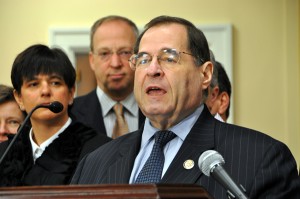National
DOMA repeal bills introduced in House, Senate
Respect for Marriage Act introduced for first time ever in Senate

House and Senate lawmakers on Wednesday pledged to lift the Defense of Marriage Act from the books upon the introduction of legislation that would repeal the anti-gay law that bars federal recognition of same-sex marriage.
In the House, Rep. Jerrold Nadler (D-N.Y.) introduced the legislation, known as the Respect for Marriage Act, along with 108 co-sponsors. Among the supporters are the four openly gay members of Congress: Reps. Barney Frank (D-Mass.), Tammy Baldwin (D-Wisc.), Jared Polis (D-Colo.) and David Cicilline (D-R.I.).
On the same day, Sen. Dianne Feinstein (D-Calif.), among the 14 senators who voted against DOMA in 1996, introduced companion legislation in the Senate. Among the 18 co-sponsors of the Senate bill are Patrick Leahy (D-Vt.), Kirsten Gillibrand (D-N.Y.), Chris Coons (D-Del.) and Richard Blumenthal (D-Conn.).
Feinstein’s introduction of the bill in the Senate marks the first time that DOMA repeal legislation has been put forward in the upper chamber of Congress since the law’s passage 15 years ago.
At a news conference on Wednesday, Nadler denounced DOMA for treating married same-sex couples as “complete strangers” under federal law.
“This defies common sense and harms thousands of married couples who are denied federal responsibilities and rights, including access to programs like Social Security, that other couples can count on when getting married,” Nadler said.
Baldwin said those who have been fighting DOMA since it became law have always known fairness and justice were on their side.
“Repealing DOMA is important symbolically and substantively,” Baldwin said. “Now that we have repealed ‘Don’t Ask, Don’t Tell,’ the Defense of Marriage Act remains the only example of overt discrimination against gays and lesbians written into our federal statutes.”
In a separate conference later in the day, Feinstein noted that DOMA bars married same-sex couples from obtaining access to government programs that straight couples enjoy for economic stability.
“Right now, because of DOMA, these couples cannot take advantage of federal protections available to every other married couple in this country,” she said.
Gillibrand said the fight to repeal DOMA is about fairness and called the ability to get married and start a family “a basic human right.”
“Every loving couple in America deserves this right, and no politician should stand in their way,” Gillibrand said. “Marriage is the foundation for strong families; it gives couples the base they need to build a long-lasting life together, start a family, raise children and put their children on the successful path for their future.”
Gillibrand commended states throughout the country for legalizing same-sex marriage and added she “looks forward to the day … when marriage equality is the law of the land from coast to coast.”
Passed by Congress in 1996, DOMA was signed into law by President Clinton. Both Clinton and the bill’s sponsor at the time, former Republican Congressman Bob Barr, have come out for repeal of the legislation.
DOMA has two components: one that prohibits the federal government from recognizing same-sex marriage and another that allows states not to recognize such marriages performed in other jurisdictions.
As a result of the component of DOMA known as Section 3, married same-sex couples cannot participate in federal programs. For instance, they can’t file joint federal income faxes, receive spousal benefits under Social Security or obtain exemptions of the estate tax law upon the death of one of the spouses.
At the House news conference, Evan Wolfson, executive director of Freedom to Marry, said repeal of DOMA is important because “we do not have second-class citizens, and we should not have second-class marriages.”
“To be excluded from marriage … is personal and a real hardship,” Wolfson said. “It is an indignity and it is manifest injustice when it is discrimination practiced by the government.”
In addition to repealing DOMA, the Respect for Marriage Act contains a “certainty provision” that would allow same-sex couples married in one juridiction to continue to receive the federal benefits of marriage even if they move to a state that doesn’t recognize same-sex marriage.
But the proposed legislation wouldn’t cover all relationship recognition that same-sex couples can access throughout the United States. Gay couples in civil unions or domestic partnerships aren’t covered under the legislation.
Married same-sex couples that claim they’ve experienced hardship under DOMA were present at the news conferences to advocate for the law’s repeal.
Pali Cooper, a chiropractor from Corte Madera, Calif., who married her spouse, Jeanne Rizzo, executive director of the Breast Cancer Fund, in 2008 when same-sex marriage was legal in California, said DOMA prevented her and her spouse from receiving full rights under the law.
“We’re married in California, but we’re single with the government, and it’s confusing, cumbersome and it’s simply unnecessary,” Cooper said.
Rizzo recalled that when returning from a trip abroad, U.S. Customs forced she and her spouse to re-enter into the United States in separate waiting lines because they weren’t legally married in the eyes of the federal government.
“Right at that moment, it really, really hit me — the difference between, ‘Yes, we were all celebrating being married in California,’ but in the eyes of our government, we were not,'” Rizzo said.
Several lawsuits seeking to overturn the part of DOMA prohibiting federal recognition of same-sex couples are making their way through the courts. Last month, President Obama declared the law unconstitutional and said he would no longer defend the statute against litigation in court, although House Speaker John Boehner has directed counsel to defend the law.
Nadler said opponents of the law shouldn’t wait for the lawsuits to end before moving ahead legislatively.
“Rather than delegating the issue to the court, Congress should repeal DOMA now and bring an end to the harm it causes gay and lesbian families each and every day,” Nadler said.
The House version of the DOMA repeal legislation has new co-sponsors that weren’t seen in the 111th Congress when the bill was first introduced in that chamber, including Frank, House Minority Leader Nancy Pelosi (D-Calif.) and House Minority Whip Steny Hoyer (D-Md.).
In the previous Congress, Frank said he wasn’t a co-sponsor of the legislation because he thought the certainty provision of the bill would cause political problems. Frank said he changed his mind because of the importance of educating House members.
“It just seemed to me that that was the more important message to get across at this point,” Frank said. “I’m less worried about the distraction on the question of the recognition by one state violating another state’s right.”
Drew Hammill, a Pelosi spokesperson, explained that Pelosi rarely co-sponsored any legislation during the time when Democrats held a majority in the chamber.
“She sponsored bills very rarely as speaker, and she has fought against discrimination her entire congressional career, regardless of what bills she has sponsored as speaker or leader,” Hammill said.
Despite the new support for the legislation in Congress, passage of DOMA repeal legislation remains an uphill battle to say the least — especially with a Republican majority in the House. A spokesperson for Boehner declined to comment on the Respect for Marriage Act.
Nadler said the Republican-controlled House Judiciary Committee is “uncommitted at this point” on whether to take up the Respect for Marriage Act.
“We’re going to ask for that,” Nadler added. “The fact that 108 people put their names on the bill initially before it’s introduced shows a considerable amount of support for it, obviously.”
In the Democratic-controlled Senate, passage would be difficult even if all 53 Democrats in the chamber voted to approve the repeal legislation. A spokesperson for Senate Majority Leader Harry Reid (D-Nev.) didn’t respond on short notice to the Washington Blade’s request to comment on the bill.
A Senate Democratic aide, who spoke on condition of anonymity, said leadership from the Obama administration and education of members of Congress has to happen before DOMA repeal moves forward.
“What is on everyone’s radar is budget: Budget 1, Budget 2, Budget 3,” the aide said. “That’s what everyone is thinking about right now in the Senate. The problem is you’re going to have to get 60 votes in the Senate for this thing, and that’s a high hurdle, especially with 53 Democrats.”
Shin Inouye, a White House spokesperson, said the president is committed to DOMA repeal and will work with Congress to move ahead on the issue.
“The president has long said that DOMA is discriminatory and should be repealed by Congress,” Inouye said. “We welcome the introduction of bills that would legislatively repeal DOMA, and look forward to working with lawmakers to achieve that goal.”
Even if proponents of DOMA repeal don’t pass the legislation in this Congress, Feinstein said the bill’s supporters will continue working for the bill in the years ahead.
“It’s a long road; we have undertaken to go on that road and make those changes,” Feinstein said. “As has been said, whether it takes one year, or two years, or three years, or four years, we are committed to it.”
Feinstein said she thinks the legislation could pass out of the Senate Judiciary Committee after the panel holds hearings on the issue, although she said she doesn’t have a timeline for when she thinks the legislation would progress in the Senate.
“I tend to think we’ll be successful at that stage and then will come the time for floor consideration,” Feinstein said. “When the hearings are held, nobody can say we pushed anything through, but everybody has the chance to express themselves.”
One major obstacle for passing the legislation is lack of Republican co-sponsors on either the House or the Senate bill.
In the House. Nadler said he’s hoping Republican co-sponsors will sign on to the bill, noting that members of the GOP, such as former Vice President Dick Cheney and gay former Republican National Committee chair Ken Mehlman have endorsed same-sex marriage.
“The political factors that made for less Republican support are going down,” Nadler said. “I’m confident we will have Republican support over time, and the sooner the better obviously.”
Even though the Senate is under Democratic control, Republican support would be needed to reach the 60-vote threshold to pass the legislation out of the chamber.
Feinstein expressed confidence that Republican support will grow for the Senate version of the bill.
“I think as the community gets to talk with Republicans, and people from Republican areas talk with Republicans, there is growing … support,” Feinstein said.
Christian Berle, deputy executive director of the Log Cabin Republicans, said his organization will work to obtain more Republican support for the Respect for Marriage Act.
“We are confident that there will be a Republican on the House bill, and potentially the Senate bill, and we will be one step closer to ending this failed policy,” Berle said. “We look forward to help building a broad, bipartisan majority that will get repeal of DOMA to the president’s desk, and get the federal government out of the marriage business.”
Florida
Disney’s Gay Days ‘has not been canceled’ despite political challenges
GayDays is moving forward with its planned LGBTQ meet-up

Gay Days in Orlando is preparing for its 2026 gathering though organizers have yet to release full details.
Concerns emerged about the status of the annual meetup of LGBTQ people at Walt Disney World in Orlando, Fla., after social media posts and multiple news outlets reported the event would not take place this year.
In response to inquiries from the Blade, Josh Duke, co-owner of Gay Days, clarified that an update would come this week.
“At this time, I’d like to clarify that Gay Days Orlando has not been canceled,” an email to the Blade said. “We are currently finalizing details regarding our plans for 2026 and will be making an official announcement later this week.”
Earlier this week, Gay Days posted about a pause in their plans for the annual meeting, which quickly gained traction online.
In an official statement on social media, Gay Days organizers cited several factors behind what had initially appeared to be a cancellation of their 2026 event.
“Changes to our host hotel agreement, the loss of key sponsorship support, and broader challenges currently impacting LGBTQIA+ events nationwide made it impossible to deliver the experience our community deserves,” organizers wrote. However, the statement added, “This is a pause — not an ending.”
In a longer message shared with supporters, organizers elaborated on that now-reversed decision.
“Gay Days Family — it is with very heavy hearts that we share Gay Days 2026 will not take place this year. This was an incredibly difficult decision and one that was only made after every possible option was explored.
“Gay Days has always been more than an event — it is community, family, and a place where so many memories are made. While this pause is painful, it also gives us the opportunity to step back, listen, and begin shaping a stronger and reimagined GayDays for the future. Thank you for your continued love, patience, and support. This is not goodbye — it’s a reset, and we look forward to creating the future of GayDays together.”
GayDays, which began in 1991, encourages queer Disney fans to visit the Orlando theme park while wearing red shirts to identify one another. Originally focused on gay men reclaiming the childhood joy often denied due to homophobia, the event has expanded over the years to include LGBTQ+ families on summer vacations and queer couples honeymooning in the Magic Kingdom.
Disney made history in 2019 by holding its first-ever official Pride event at its European park, Disneyland Paris. In 2023, Disneyland California hosted the first U.S. official Pride event.
Concerns about the potential cancellation had arisen amid broader challenges affecting LGBTQ events nationwide. These include changes in hotel agreements, sponsorship support, and Florida’s increasingly restrictive anti-LGBTQ policies under Gov. Ron DeSantis. Florida currently has an equality score of -3.00 out of 49 from the Movement Advancement Project, which evaluates states based on policies affecting relationship and parental recognition, nondiscrimination, religious exemptions, LGBTQ youth, healthcare, criminal justice, and transgender identity documentation.
Recent legislation in Florida has included prohibitions on hormone replacement therapy for transgender minors, restrictions on adult access to treatment, bans on drag performances for those under 18, bathroom bans for transgender people in state buildings, and expansion of the Parental Rights in Education Act, commonly called the “Don’t Say Gay” law. These measures limit public school instruction or discussion about sexual orientation and gender identity.
Gay Days Anaheim is scheduled to take place at Disneyland Resort in September.
Disney has also maintained a focus on Pride, reporting in 2022 that proceeds from Pride merchandise benefited numerous LGBTQ organizations, including GLSEN, PFLAG, The Trevor Project, Zebra Coalition, the Los Angeles LGBT Center, the LGBT Center Orange County, the San Francisco LGBT Center, and the Ali Forney Center. Pride merchandise sold internationally supports local LGBTQ organizations in those regions.
More details about this event are expected to be released on Friday.
New York
Pride flag removed from Stonewall Monument as Trump targets LGBTQ landmarks
The new NPS policy targets Pride flags amid consistent efforts from the Trump administration to minimize LGBTQ history.

A rainbow Pride flag flying at the Stonewall National Monument in New York was removed at the direction of Trump administration officials at the National Park Service, according to a source familiar with the matter who spoke to the Blade on condition of anonymity.
The source said the move had been in the works for weeks and is part of ongoing efforts by the Trump-Vance administration to erase LGBTQ identity from federally controlled landmarks.
In response to the Blade’s request for information about the new flag policy, the National Park Service provided the following statement:
“Current Department of the Interior policy provides that the National Park Service may only fly the U.S. flag, Department of the Interior flags, and the Prisoner of War/Missing in Action flag on flagpoles and public display points. The policy allows limited exceptions, permitting non-agency flags when they serve an official purpose. These include historical context or reenactments, current military branch flags, flags of federally recognized tribal nations affiliated with a park, flags at sites co-managed with other federal, state, or municipal partners, flags required for international park designations, and flags displayed under agreements with U.S. Citizenship and Immigration Services for Naturalization ceremonies.”
The statement also included official guidance on the display of non-agency flags issued by Trump-appointed National Park Service Director Jessica Bowron.
The Blade reached out to other organizations to confirm the status of the Pride flag last week, including the Stonewall National Monument Visitor Center, the NYC Landmarks Preservation Commission, and the National Parks Conservation Association. None were able to provide details about whether the flag was still flying at that time but it has since been removed.
This action aligns with other moves targeting and erasing LGBTQ history. In September, the Blade reported that three organizations originally slated to receive more than $1.25 million from the National Park Service’s Underrepresented Communities Grant Program would no longer receive funding: In Washington, D.C., the Preservation League had been awarded $75,000 to document LGBTQ+ historic resources. In Providence, R.I., the Preservation Society was slated for $74,692 to conduct an LGBTQ+ survey and prepare a National Register nomination. And in New York, the Fund for the City of New York, Inc., had been awarded $32,000 to nominate the residence of Bayard Rustin — the iconic civil rights and LGBTQ activist — as a National Historic Landmark.
Puerto Rico
Bad Bunny shares Super Bowl stage with Ricky Martin, Lady Gaga
Puerto Rican activist celebrates half time show

Bad Bunny on Sunday shared the stage with Ricky Martin and Lady Gaga at the Super Bowl halftime show in Santa Clara, Calif.
Martin came out as gay in 2010. Gaga, who headlined the 2017 Super Bowl halftime show, is bisexual. Bad Bunny has championed LGBTQ rights in his native Puerto Rico and elsewhere.
“Not only was a sophisticated political statement, but it was a celebration of who we are as Puerto Ricans,” Pedro Julio Serrano, president of the LGBTQ+ Federation of Puerto Rico, told the Washington Blade on Monday. “That includes us as LGBTQ+ people by including a ground-breaking superstar and legend, Ricky Martin singing an anti-colonial anthem and showcasing Young Miko, an up-and-coming star at La Casita. And, of course, having queer icon Lady Gaga sing salsa was the cherry on the top.”
La Casita is a house that Bad Bunny included in his residency in San Juan, the Puerto Rican capital, last year. He recreated it during the halftime show.
“His performance brought us together as Puerto Ricans, as Latin Americans, as Americans (from the Americas) and as human beings,” said Serrano. “He embraced his own words by showcasing, through his performance, that the ‘only thing more powerful than hate is love.’”
-

 Colombia4 days ago
Colombia4 days agoLGBTQ Venezuelans in Colombia uncertain about homeland’s future
-

 District of Columbia4 days ago
District of Columbia4 days agoD.C. bar Rush facing eviction on charge of failing to pay rent
-

 District of Columbia4 days ago
District of Columbia4 days agoD.C. non-profits find creative ways to aid the unhoused amid funding cuts
-

 Sports4 days ago
Sports4 days agoBlade, Pride House LA announce 2028 Olympics partnership






















